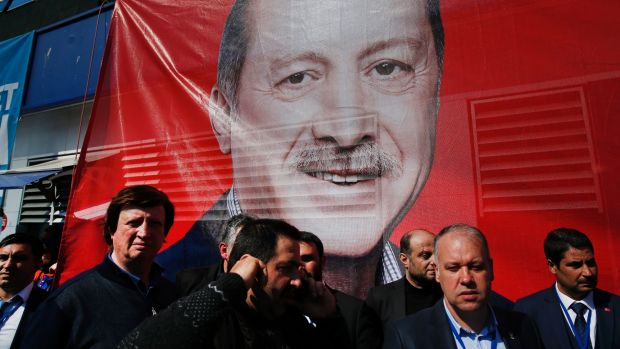The Turkish referendum is an internal political situation of a nation that has received a lot of attention from around the world. And why not? After all, Turkey is one of the fastest movers and shakers of this century. In just over a decade, it has joined the G20 richest industrial nations in the world.
Yet, despite this showing of economic strength, Europe has been slow to embrace Erdogan's legitimate rise to power.

Turkey has been shunned by the EU on several occasions whereby its application has become a farce and the sincerity of the EU is in question, driving Turkey further and further away. It's not surprising Erdogan has looked for other options. At this stage, Turkey without EU membership is more likely to turn into an independent entity, bringing it closer to countries like China and Russia. It has the potential to become the main power both militarily and economically in the Middle East and to become a quasi-sheriff state, policing much of the issues in the volatile region.
Erdogan has carved his own name indelibly into Turkish history having successfully manipulated his party's political supremacy over four elections and his personal ascendancy as the president. One could argue he is the greatest leader the nation has known since Ataturk.

In the past four elections he has led the party to victory and has made sweeping constitutional reforms. He's firmly established economic successes for the nation, bringing an affluence that most Turks have never tasted. This sense of economic stability is one of the major factors in returning the AK Party to power. However, the other factor that cannot be ignored is the attempted military coup of 2016. This has turned the country upside down and polarised the nation's 85 million citizens. Of course, this played into Erdogan's hands and set up his victory in the referendum. It is likely he will get the 51 per cent he needs to put him in power for the next 10 years at least.
A lot of pundits are screaming that this is the end of democracy in Turkey and this could lead to the establishment of a sharia style dictatorship.
But those who want to see Turkey fail have been doing their best to rid the nation of Erdogan. Time after time, he has survived. Every obstacle in his way has only strengthened his resolve and bolstered his support.
Driving Erdogan further into the arms of autocratic nations like Russia and China is problematic and it could create more tension in the region between old foes Iran and tentative allies Israel. The lack of a strong US-Turkish relationship will mean Turkey could go rogue and have more influence over smaller neighbouring countries such as Syria, Lebanon and interfere in Israel's conflict with Palestine. Also, it could exert more influence in Islamic nations such as Somalia, Libya, Yemen or Syria and speak up for the beleaguered Muslim Rohingya minority in Myanmar. But these are all hypotheticals.
A new US-style presidential system in Turkey could mark the end of an era of instability marked by military coups and political turmoil. It is for this reason exactly that Erdogan is a vital component for the longevity of the new system. The drawbacks are that Erdogan will be given unprecedented powers and there is potential for lack of freedoms and rights in the nation especially for journalists and opponents of Erdogan. Yet, transition into a representative republic could see Turkey become the beacon of hope for the rest of the Muslim world. In fact, the only other fully democratic Muslim nation, which is also in the G20, is Indonesia. If Turkey follows a similar path to that of Indonesia it could become a superpower by 2030.
A conservative Islamic party and president in Turkey are more important than a secular but weak coalition made up of old school-style leaders, who would take Turkey back to the past where it was a passive player in the region and was dominated by its generals.
This referendum ushers in a new era for Turkey and with it will come a sense of prestige that will raise it to a regional power, alongside Russia and the US. For Turkey as a nation, a strong and stable president will allow the economy to grow and the society to prosper. Without Erdogan, Turkey will be manipulated by foreign powers and pushed back into a position of mediocrity, becoming the limp fish of the region.
For the Muslim world, a strong Erdogan-led Turkish state, which is proud of its Islamic roots and identity, will bring some glimmer of optimism for millions of Muslims who have lost hope in their own political leaders. Turkey will become the leader who will speak up for their cause. This is in direct response to the increasing tide of Islamophobia. The Turks are aware of this and with time will be the countering force to the growing resentment in Western societies towards Islam.
There is little to fear. Just because Erdogan and the AKP have Islamic beliefs, does not mean that secular and democratic processes will be undermined. In fact those conservative religious values will make both justice and freedom the cornerstone of the 'New Turkey'.
Kuranda Seyit is the Director of the Forum on Australia's Islamic Relations.
Source : http://www.smh.com.au
Post Disclaimer | Support Us
Support Us
The sailanmuslim.com web site entirely supported by individual donors and well wishers. If you regularly visit this site and wish to show your appreciation, or if you wish to see further development of sailanmuslim.com, please donate us
IMPORTANT : All content hosted on sailanmuslim.com is solely for non-commercial purposes and with the permission of original copyright holders. Any other use of the hosted content, such as for financial gain, requires express approval from the copyright owners.
 Sri lanka Muslims Web Portal Sri Lanka Muslims News Center
Sri lanka Muslims Web Portal Sri Lanka Muslims News Center
 Donate
Donate


